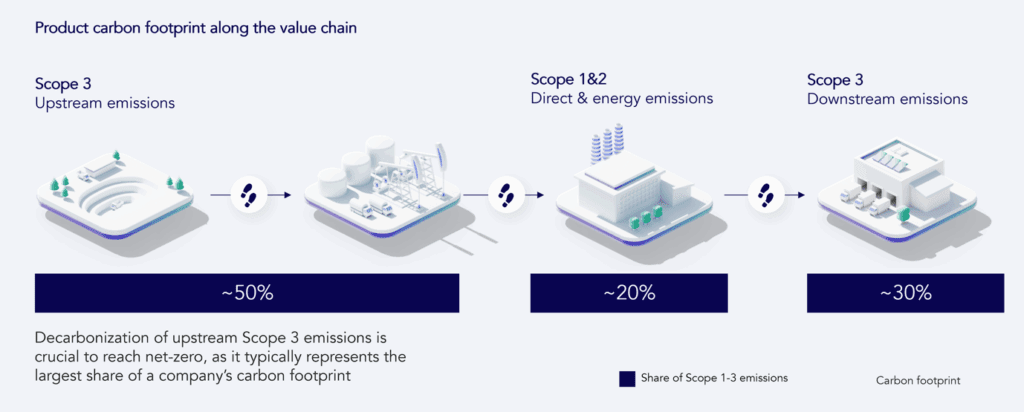 4 steps to conducting a materiality assessment
4 steps to conducting a materiality assessment
In 2025, the demand from consumers for clarity and accountability on carbon emissions is only increasing. Data sharing is, therefore, crucial to enable companies to collaborate and innovate for a sustainable future. At Nexio Projects, we’ve found that more and more of our clients are interested in learning how they can transparently declare the impacts of their products.
Last year, we worked with the PACT (Partnership for Carbon Transparency) initiative, alongside Unilever, to conduct bespoke life cycle assessment (LCA) models and product carbon footprints (PCFs) for several of Unilever’s suppliers. This blog reflects on the lessons learned from this journey, and how we can use these to champion further transparency in the future.
Curious about our collaboration with PACT and Unilever? Watch the full webinar now!
Lesson #1: The vital role of primary and reliable data for transparency
One of the main lessons was that transparency cannot happen without reliable data. During the project, we used the PACT Methodology to create product carbon footprints for Unilever suppliers’ products. This involved completing life cycle assessments (LCAs), with inventories based on primary data provided directly by suppliers. Data categories included energy use, material inputs and waste outputs from the manufacturing process.
This experience highlighted why reliable primary data is essential for companies to make informed, data-driven decisions and effectively decarbonise their supply chains. This is because primary data enhances the accuracy and reliability of the PCFs produced and reported, ensuring that subsequent LCAs and corporate carbon footprint assessments based on these PCFs are also more dependable.
The PACT Methodology aims to provide a standardised and comparable framework for calculating PCF data, and exchanging it securely between systems – prioritising the quality and accuracy of data. As LCA practitioners, it is therefore our duty to ensure that we maintain a high standard of data quality across the board, and to advocate for the transparent sharing of the background data that makes up the PCFs provided by suppliers.

Lesson #2: Accounting is key when navigating an evolving regulatory landscape
Another lesson we learned was the importance of accounting for the dynamic, changing climate regulatory landscape, where new standards, guidelines, and expectations are constantly emerging. For example, PCFs are essential for conducting accurate carbon footprint assessments that are aligned with the GHG Protocol standards, publishing EPDs and complying with upcoming CBAM regulations. A potential benefit of leveraging an initiative such as PACT for the calculation and exchange of PCF data is that it motivates users to ensure that PCFs are kept up to date, allowing organisations to stay ahead of regulatory changes. This underlines the point that there is always room to add to and improve the LCA models we build.
Lesson #3: It is essential to embrace a holistic approach to environmental metrics
Finally, it is important to remember that product carbon footprint is not the only metric we should use to measure environmental impact. While the PACT Methodology provides a robust basis for transparently calculating and reporting PCFs, it is crucial to adopt a holistic perspective. Climate change potential (measured in kg CO2e) represents only one aspect of environmental impact, which in itself is only one pillar of sustainability.
For example, a life cycle assessment (LCA) model can also provide insights into the impacts related to human health and environmental toxicity. It is equally important to consider transparency regarding the social and economic pillars of sustainability. For instance, factors such as resource efficiency, waste management, water usage and social equity should be accounted for to provide a more complete picture.
Supplier case study: Providing tailored PCF support for Rose Acre Farms
As the second-largest egg producer in the US, Rose Acre Farms is a key supplier to Unilever and an active participant in the Unilever Supplier Climate Programme. In collaboration with Nexio Projects and Ecochain, the company embarked on a project to calculate the product carbon footprint (PCF) of the liquid egg products it supplies to Unilever. However, with 15 farms across the US housing more than 20 million birds, accurately mapping the environmental impact of even one product was no easy task.
Although the company had already conducted carbon footprint assessments at an organisational level, developing a reliable and representative product carbon footprint (PCF) calculation framework presented a distinct set of challenges. “To ensure a standardised result, we first had to calculate how many eggs go into a kilogram of liquid product and how many hens are needed to produce that quantity,” explains Doster Harper, Director of Sustainability at Rose Acre Farms. “From there, we had to calculate how much feed, energy and other inputs were needed to support that number of hens. It was a complex allocation process, but with the support of Nexio Projects and Ecochain, we were able to determine the carbon footprint per kilogram of product.”
The outcome was a comprehensive PCF that mapped the entire egg production chain, revealing key emission hotspots. In particular, two priority areas emerged: feed sourcing and energy generation. “By conducting a full product carbon footprint assessment, we will be able to take a much more targeted approach going forward,” continues Doster. “The resources provided by Nexio, Ecochain and Unilever on this journey were more than what we required to be successful – enabling us to gain greater clarity on our product carbon footprints and build capacity for ongoing emissions reductions.”
Looking ahead, the capabilities developed through conducting the PCF for a single product type have provided Rose Acre Farms with a strong foundation for future sustainability efforts. With key processes now in place, the company is well positioned to expand its PCF programme to a broader range of products. “With sustainability regulations on the horizon, we can now move forward with greater confidence,” concludes Doster. “Having reliable data allows us to identify even more opportunities for improvement – and going through this process has also strengthened our ability to transparently communicate our sustainability progress with our customers.”
Working together for a more transparent future
This productive partnership has been a valuable demonstration of how standardised data-sharing methodologies can facilitate greater supply chain transparency. As a result, the lessons learned can also be applied to our broader work at Nexio Projects as we help clients bring clarity to all aspects of their sustainability journeys. We are proud to continue our collaboration with Unilever as a delivery partner for their Supplier Climate Programme, supporting shared efforts to reduce greenhouse gas emissions and drive sustainable practices across the supply chain.
Who are we?
Nexio Projects is one of the top ESG and sustainability consulting firms globally, as recognised by Verdantix. Our dedicated climate experts support organisations in shaping ambitious decarbonisation strategies that align with both compliance and long-term value creation.
We help you:
• Set science-based targets that drive credible climate action
• Calculate and manage Scope 1, 2 and 3 emissions
• Identify emission hotspots and strategic reduction pathways
• Prepare for CSRD-aligned disclosures and stakeholder expectations
• Build internal capacity for ongoing climate management
Looking for support with product carbon footprints, life cycle assessments or decarbonisation strategy? Visit our Product sustainability service page or get in contact with one of our experts for a free consultation.
Learn more about this collaboration from our video, where counterparts from Ecochain and Unilever join us to explain the importance of supplier engagement programmes.
Curious about tackling Scope 3 emissions? Download our newest guide for tips that are tailored for your organisation, and subscribe to our newsletter to get consistent updates.
Further reading:
- PACT Technical Specifications: How to build your solution’s API to be able to exchange interoperably with other solutions in the PACT Network. | PACT Resources
Frequently asked questions
What is a carbon footprint and why does it matter for companies?
A carbon footprint measures the total greenhouse-gas emissions associated with a company’s operations or value chain. It matters because it highlights climate impact, informs reduction targets, and drives regulatory or investor readiness.
How can companies calculate their Scope 1, 2 and 3 emissions accurately?
Companies should gather direct (Scope 1) and indirect energy (Scope 2) data from operations, then collaborate with suppliers and customers for Scope 3 emissions, ensuring consistent methodologies and credible data sources.
What role does collaboration play in reducing carbon footprints?
Collaboration with suppliers, customers, and industry partners enables shared data collection, aligned reduction strategies, and collective actions—amplifying impact and reducing cost-per-ton of CO₂ abated.
How should a company use its carbon footprint data to drive climate action?
Use the data to prioritise high-impact emission sources, set science-based targets, integrate reduction projects into operational planning, and openly report progress through sustainability disclosures.
What pitfalls should companies be aware of when managing their carbon footprints?
Pitfalls include relying solely on offsets without reducing emissions, ignoring value-chain emissions (Scope 3), using inconsistent tools across departments, and failing to align reduction efforts with business strategy.












